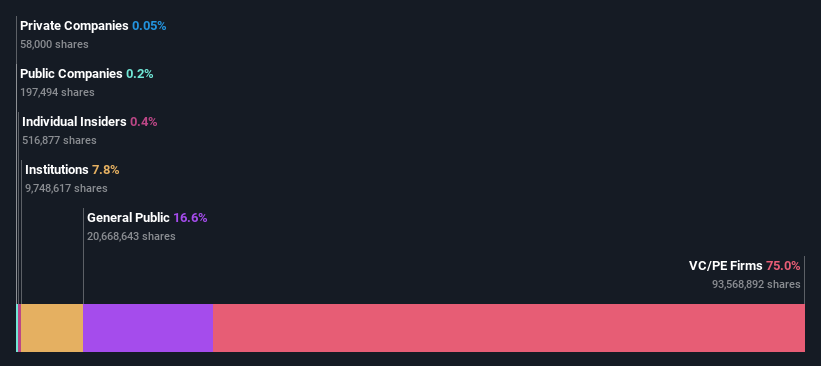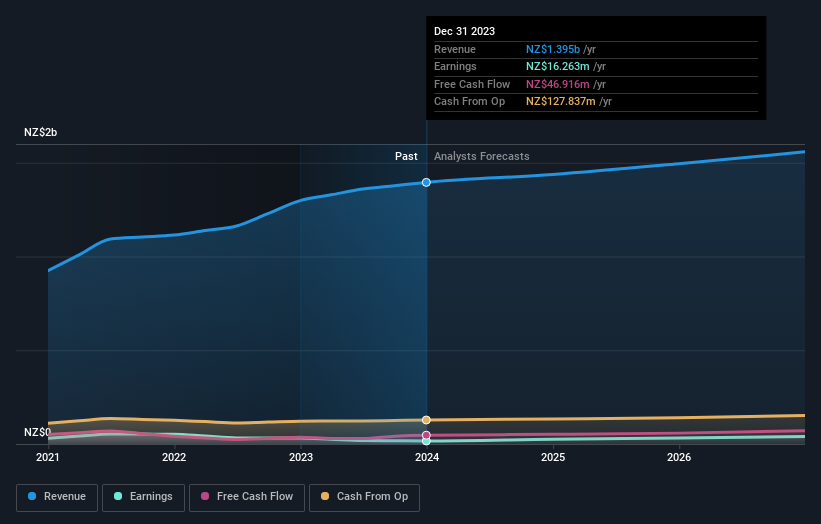- New Zealand
- /
- Hospitality
- /
- NZSE:RBD
Restaurant Brands New Zealand Limited's (NZSE:RBD) last week's 10.0% decline must have disappointed private equity firms who have a significant stake

Key Insights
- The considerable ownership by private equity firms in Restaurant Brands New Zealand indicates that they collectively have a greater say in management and business strategy
- Finaccess Capital owns 75% of the company
- Ownership research, combined with past performance data can help provide a good understanding of opportunities in a stock
To get a sense of who is truly in control of Restaurant Brands New Zealand Limited (NZSE:RBD), it is important to understand the ownership structure of the business. We can see that private equity firms own the lion's share in the company with 75% ownership. That is, the group stands to benefit the most if the stock rises (or lose the most if there is a downturn).
And following last week's 10.0% decline in share price, private equity firms suffered the most losses.
In the chart below, we zoom in on the different ownership groups of Restaurant Brands New Zealand.
Check out our latest analysis for Restaurant Brands New Zealand

What Does The Institutional Ownership Tell Us About Restaurant Brands New Zealand?
Institutions typically measure themselves against a benchmark when reporting to their own investors, so they often become more enthusiastic about a stock once it's included in a major index. We would expect most companies to have some institutions on the register, especially if they are growing.
Restaurant Brands New Zealand already has institutions on the share registry. Indeed, they own a respectable stake in the company. This suggests some credibility amongst professional investors. But we can't rely on that fact alone since institutions make bad investments sometimes, just like everyone does. It is not uncommon to see a big share price drop if two large institutional investors try to sell out of a stock at the same time. So it is worth checking the past earnings trajectory of Restaurant Brands New Zealand, (below). Of course, keep in mind that there are other factors to consider, too.

Hedge funds don't have many shares in Restaurant Brands New Zealand. Finaccess Capital is currently the largest shareholder, with 75% of shares outstanding. With such a huge stake in the ownership, we infer that they have significant control of the future of the company. For context, the second largest shareholder holds about 3.0% of the shares outstanding, followed by an ownership of 2.0% by the third-largest shareholder.
Researching institutional ownership is a good way to gauge and filter a stock's expected performance. The same can be achieved by studying analyst sentiments. While there is some analyst coverage, the company is probably not widely covered. So it could gain more attention, down the track.
Insider Ownership Of Restaurant Brands New Zealand
The definition of an insider can differ slightly between different countries, but members of the board of directors always count. The company management answer to the board and the latter should represent the interests of shareholders. Notably, sometimes top-level managers are on the board themselves.
Most consider insider ownership a positive because it can indicate the board is well aligned with other shareholders. However, on some occasions too much power is concentrated within this group.
Our information suggests that Restaurant Brands New Zealand Limited insiders own under 1% of the company. It has a market capitalization of just NZ$397m, and the board has only NZ$1.6m worth of shares in their own names. We generally like to see a board more invested. However it might be worth checking if those insiders have been buying.
General Public Ownership
With a 17% ownership, the general public, mostly comprising of individual investors, have some degree of sway over Restaurant Brands New Zealand. This size of ownership, while considerable, may not be enough to change company policy if the decision is not in sync with other large shareholders.
Private Equity Ownership
With an ownership of 75%, private equity firms are in a position to play a role in shaping corporate strategy with a focus on value creation. Some investors might be encouraged by this, since private equity are sometimes able to encourage strategies that help the market see the value in the company. Alternatively, those holders might be exiting the investment after taking it public.
Next Steps:
It's always worth thinking about the different groups who own shares in a company. But to understand Restaurant Brands New Zealand better, we need to consider many other factors. Like risks, for instance. Every company has them, and we've spotted 3 warning signs for Restaurant Brands New Zealand (of which 1 can't be ignored!) you should know about.
But ultimately it is the future, not the past, that will determine how well the owners of this business will do. Therefore we think it advisable to take a look at this free report showing whether analysts are predicting a brighter future.
NB: Figures in this article are calculated using data from the last twelve months, which refer to the 12-month period ending on the last date of the month the financial statement is dated. This may not be consistent with full year annual report figures.
New: AI Stock Screener & Alerts
Our new AI Stock Screener scans the market every day to uncover opportunities.
• Dividend Powerhouses (3%+ Yield)
• Undervalued Small Caps with Insider Buying
• High growth Tech and AI Companies
Or build your own from over 50 metrics.
Have feedback on this article? Concerned about the content? Get in touch with us directly. Alternatively, email editorial-team (at) simplywallst.com.
This article by Simply Wall St is general in nature. We provide commentary based on historical data and analyst forecasts only using an unbiased methodology and our articles are not intended to be financial advice. It does not constitute a recommendation to buy or sell any stock, and does not take account of your objectives, or your financial situation. We aim to bring you long-term focused analysis driven by fundamental data. Note that our analysis may not factor in the latest price-sensitive company announcements or qualitative material. Simply Wall St has no position in any stocks mentioned.
About NZSE:RBD
Restaurant Brands New Zealand
Operates quick service and takeaway restaurants in New Zealand, Australia, California, Hawaii, Saipan, and Guam.
Good value with proven track record.
Market Insights
Community Narratives




